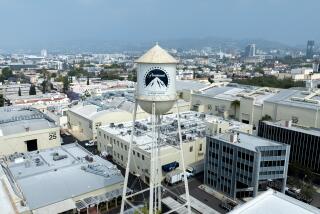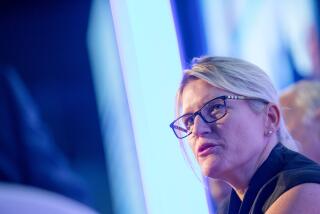Showman of the Sky : Entertainment Helps Ex-Record Tycoon’s Virgin Atlantic Airways Take Off
Richard Branson figures that the passengers who fly his airline and the customers who shop his music and video stores essentially want the same thing: entertainment. That may explain why musicians and other live acts routinely perform for passengers on his flights.
“If you are going to be strapped to an airline seat for 11 hours, you should want to be entertained,” said Branson, whose $2-billion empire includes Virgin Atlantic Airways and Virgin Megastores. “It’s critical that you have a good time, so that you come back for more.”
That business philosophy has guided Branson’s career as he’s moved from the flashy realm of the entertainment business into the rough-and-tumble domain of the airline industry.
Since selling Virgin Records--one of the world’s largest independent record labels--for nearly $1 billion earlier this year, the flamboyant British entrepreneur has plunged headlong into building his airline. He’s also expanding his Virgin Megastore record/video chain, opening the latest addition on Sunset Boulevard in West Los Angeles just last week.
Branson describes Virgin Atlantic Airways as one of his “principal passions.”
From its base in London, the airline flies some of the most popular and lucrative routes in the world--to Los Angeles, New York, Tokyo and other cities. Its growth has been spurred by the British government’s attempt to provide competition for British Airways.
After legal and regulatory battles, the bigger, more established carrier has been forced to share some valuable routes--such as London to Tokyo--with Virgin Atlantic.
Richard Bond, a transportation consultant in the London offices of Towers Perrin, said Virgin has carefully selected destinations popular with both tourists and business passengers to keep its planes full.
After eight years, Virgin flies to about a dozen international destinations from London and generates about $700 million in annual revenue. The much larger British Airways, in contrast, flies to nearly two dozen destinations in North America alone and generates more than $10 billion in annual revenue.
“It’s a very small airline,” Bond said of Virgin Atlantic. However, “they have stuck to their knitting and (carefully) added capacity to a few destinations.”
While Virgin Atlantic occupies most of Branson’s time, he continues to expand his domain. Last week, he was in Orlando, Fla., to launch Vintage Air Tours, where passengers fly restored DC3s as part of an excursion package designed to evoke travel in the 1940s.
Last Thursday, he was in Los Angeles showing off the newest Virgin Megastore, a giant record and video entertainment store. Afterward, Branson flew to Seattle to shop around for Boeing jets for his Virgin Atlantic fleet.
Branson said he still faces a wall of opposition to start service to other European countries. British Airways is also defensive about giving up valuable space at its international hub at Heathrow Airport near London.
“It’s just bloody difficult to get routes or (landing) slots at airports,” said Branson. “An enormous amount of our time is spent getting permission to compete.”
The company manages to keep costs low by running a lean staff and contracting a lot of operations that many airlines conduct in house--such as maintenance--to outside firms, Bond said.
Meanwhile, Virgin Atlantic offers passengers services and amenities that are unavailable or would cost substantially more on other carriers.
For the cost of a business-class ticket--about $5,200 round trip between Los Angeles and London--Virgin provides first-class service complete with sleeper seats, in-flight manicurists and masseuses and a limousine to and from the airport.
Such service has proven popular with business travelers, including many in the entertainment business, who make up half the airline’s customers.
Virgin plans to start service to Washington, Chicago and San Francisco over the next 18 months. But after those and a few other international routes--such as Hong Kong or Sydney--Brandon doesn’t see much further expansion of his airline.
He plans to divert his energies to other aspects of the travel industry, such as passenger trains. Within two years, after the airline reaches its desired size, Branson said Virgin might start offering its own brand of rail service from London.
“We don’t want to get too big,” he said of his airline. “Big is ugly. The bigger the airlines get, the more out of touch they get with their customers.”
Bio: Richard Branson
The British billionaire mixes entertainment with airlines.
Age: 42
Born: South London
Education: He dropped out of British public school at 16.
Family: The son of a former flight attendant, Branson is an avid balloonist who has flown across the Atlantic and Pacific oceans in a hot-air balloon. Branson, his wife and two children split their time between a townhouse in London, a country estate in Oxfordshire and a private island in the Caribbean.
Resume: After launching a national magazine for students, Branson branched out into the mail order record business and retailing. He founded Virgin Records and Virgin Atlantic Airways.
Quote: “Big is ugly. The bigger the airlines get, the more out of touch they get with their customers.”
More to Read
The biggest entertainment stories
Get our big stories about Hollywood, film, television, music, arts, culture and more right in your inbox as soon as they publish.
You may occasionally receive promotional content from the Los Angeles Times.










